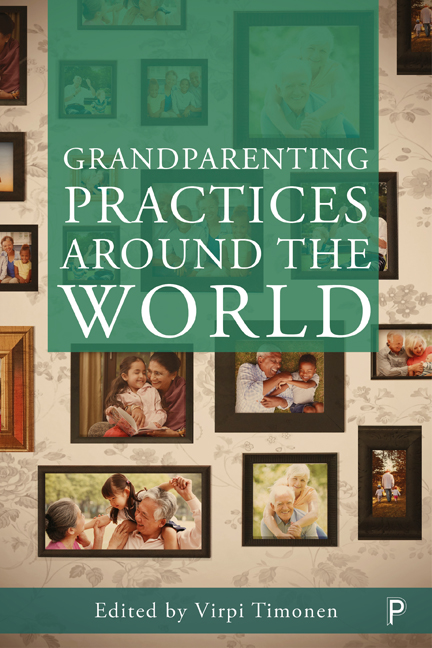Book contents
- Frontmatter
- Contents
- List of figures and tables
- List of abbreviations
- Notes on contributors
- one Introduction: widening the lens on grandparenting
- PART 1 The demographic and welfare-state contexts of grandparenting
- PART 2 Grandparenting in contexts of economic and societal development
- PART 3 Transnational grandparenting
- PART 4 Gender, intersectionalities and grandparenting
- PART 5 Grandparental roles, agency and influence
- Index
seven - Transnational grandmother–grandchild relationships in the context of migration from Lithuania to Ireland
Published online by Cambridge University Press: 22 April 2022
- Frontmatter
- Contents
- List of figures and tables
- List of abbreviations
- Notes on contributors
- one Introduction: widening the lens on grandparenting
- PART 1 The demographic and welfare-state contexts of grandparenting
- PART 2 Grandparenting in contexts of economic and societal development
- PART 3 Transnational grandparenting
- PART 4 Gender, intersectionalities and grandparenting
- PART 5 Grandparental roles, agency and influence
- Index
Summary
Introduction
Over the last two decades the east–west migration within the European Union (EU) has evoked a growing body of research on cross-national family networks, documenting new ways, forms and practices that these families generate to maintain familial ties across borders (King et al., 2014; Reynolds and Zontini, 2014; Ryan, 2011). The transnational migration approach has been adopted to reconceptualise and explore the range of contemporary migrant experiences, which are defined as lived across transnational borders, by forging and sustaining simultaneous multifaceted social relations that link together migrants’ societies of origin and settlement (Glick Schiller et al., 1995; Levitt and Glick Schiller, 2004). This approach points to the significant changes that occur in family life when family members are scattered across borders. One of the key changes is that the transnational dimension transforms a number of everyday contexts not only for migrants but also for non-migrant family members, with the latter experiencing a transnational turn without the concurrent spatial mobility (Baldassar et al., 2007; Nedelcu, 2012). As a result, transnational migration is viewed as a process affecting both migrants and their non-migrant family members and respectively conceptualised as not an individual but a collective family matter, which is framed, planned and implemented in response to multiple negotiations occurring among family members (Carling, 2008; Levitt and Glick Schiller, 2004).
Despite steady international migration across the globe and numerous studies exploring family migration and changing structures of family lives, there is a dearth of research on the dynamics of the grandparent–grandchild relationship in transnational migrant families, and particularly on how both migrant grandchildren and their non-migrant grandparents experience and perceive intergenerational ties spanning national borders. Existing literature on the intergenerational relations in transnationally scattered families has focused predominantly on parent–children relationships (for example, Baldassar et al., 2007; King et al., 2014; Madianou and Miller, 2012), and only a handful of studies have explored the changing nature of grandparenting in the context of migration from the perspective of grandparents (Banks, 2009; Plaza, 2000; Sigad and Eisikovits, 2013). The findings of these studies highlighted the challenges that geographical and cultural distances posed to traditional and socially accepted grandparenting roles and responsibilities.
- Type
- Chapter
- Information
- Grandparenting Practices around the World , pp. 131 - 148Publisher: Bristol University PressPrint publication year: 2018



